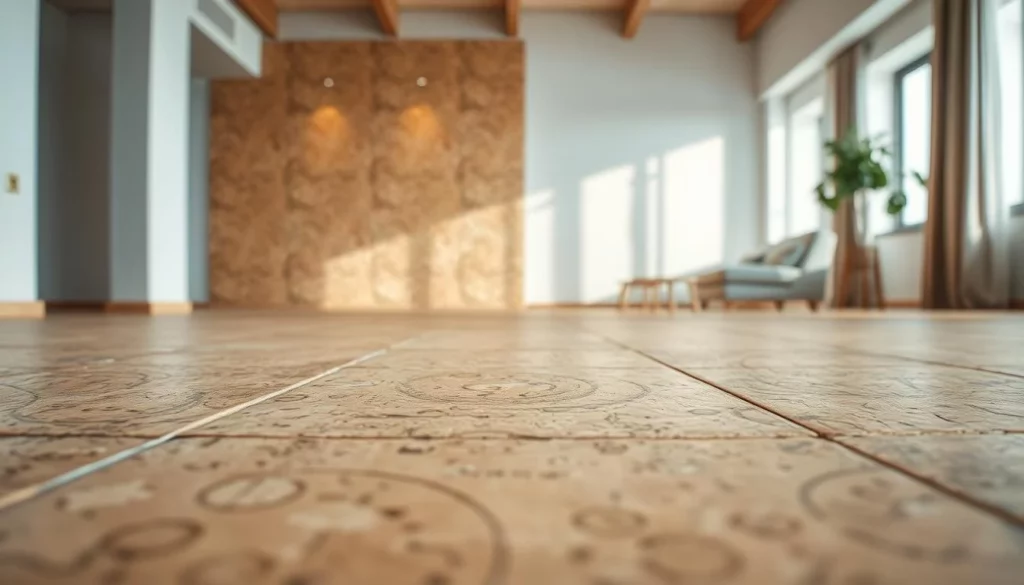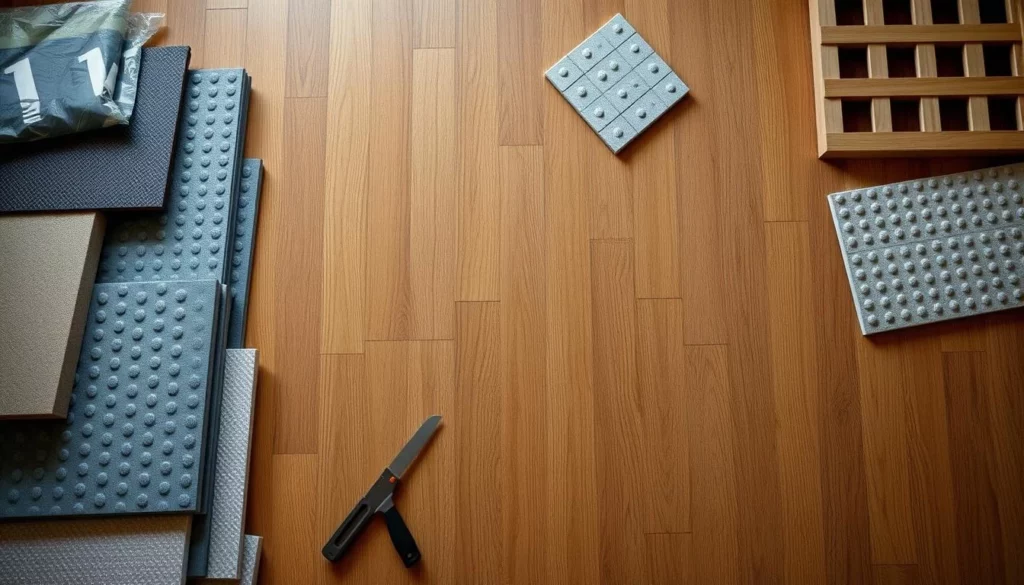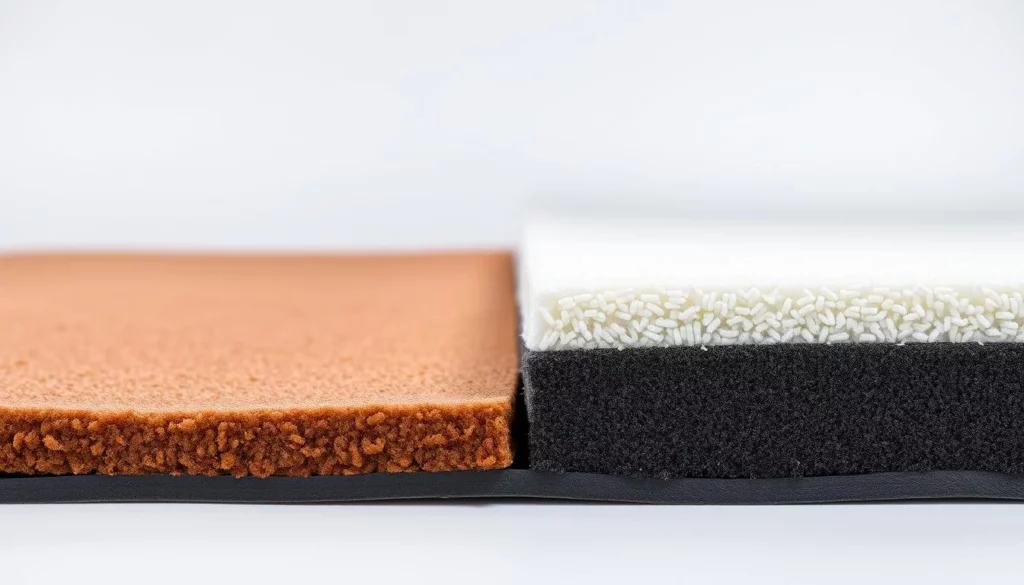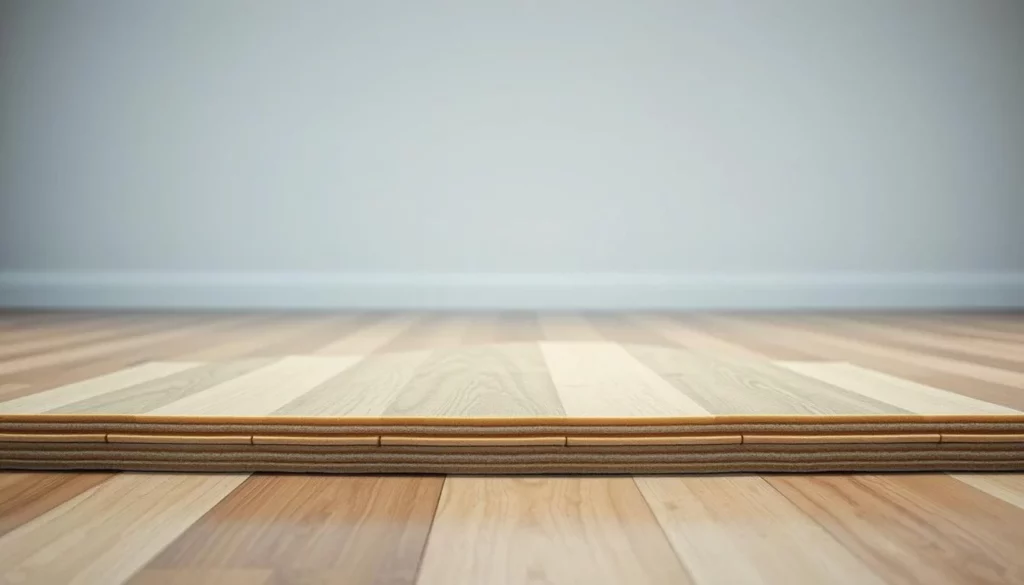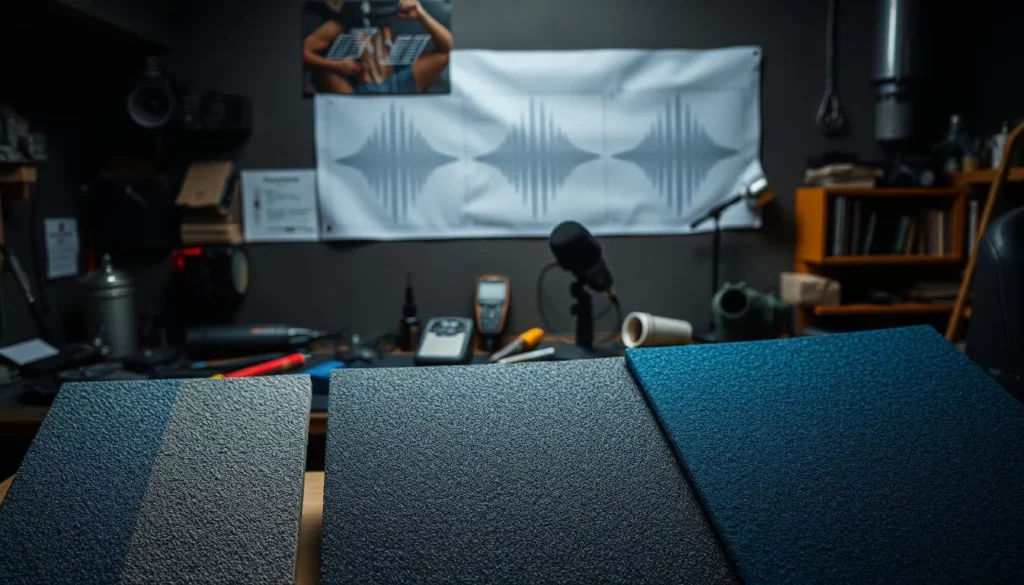Looking for a way to cut down on noise at home or work? Cork flooring is a great pick. It’s a natural soundproofing solution that’s good for the planet and your wallet.
Cork comes from the bark of cork oak trees. It has a special honeycomb structure that catches sound waves. Check out this page to learn more about cork’s soundproofing powers.
Cork flooring is top-notch at soaking up sound. It’s perfect for quieting down homes and offices. Plus, it’s tough and can handle big impacts without making a racket.
Introduction to Cork Flooring
Looking for a green and quiet flooring option? Cork is a great pick. It’s made from the bark of the cork oak tree, a resource that’s both sustainable and renewable. For centuries, cork has been prized for its sound-absorbing qualities.
Cork is harvested without harming the tree, making it eco-friendly. The bark is turned into flooring, known for its sound benefits. Cork’s honeycomb structure is perfect at soaking up sound waves, cutting down on noise.
What is Cork and How Does it Reduce Noise
Cork’s structure is key to its soundproofing abilities. Its cells, filled with air, absorb sound energy. This reduces sound transmission, making cork a top eco-friendly soundproofing option.
Cork underlayment is great for blocking impact and airborne sounds. It’s a natural, effective choice over synthetic materials. Plus, cork flooring is comfy, mold-resistant, and not just for soundproofing.
| Property | Cork Flooring | Traditional Flooring |
|---|---|---|
| Sound Absorption | Excellent | Poor to Average |
| Eco-friendliness | Highly Eco-friendly | Variable, often less eco-friendly |
| Comfort | Soft and Comfortable | Hard and Less Comfortable |
In short, cork flooring is a green, renewable choice that also fights noise. Its special properties make it perfect for enhancing the sound quality of homes or offices.
Benefits of Cork Flooring for Soundproofing
Cork flooring is a top choice for soundproofing because of its natural properties. It helps cut down on noise in homes and offices, making them quieter. This makes your space more peaceful.
The natural sound absorption properties of cork are key. It absorbs sound waves, unlike other floors that bounce them back. This is great for homes with many levels or offices where quiet is important.
Natural Sound Absorption Properties
Cork’s sound-absorbing power comes from its unique cellular structure. It’s filled with air, which helps it soak up sound. This also makes it good at keeping warm or cool, unlike other soundproofing materials.
Comparison to Other Flooring Materials
Looking at soundproofing flooring, cork is a standout. Here’s why:
- Cork is a natural, eco-friendly option compared to synthetic materials.
- It beats hardwood or laminate in sound absorption because of its soft cells.
- Cork lasts longer and wears better than carpet, which can wear out over time.
In summary, cork flooring is a great choice for soundproofing. It’s effective, sustainable, and improves sound quality in many places.
How Cork Flooring Reduces Noise
Cork flooring is great for reducing noise. It absorbs sound well, making spaces quieter and more comfortable.
Cork flooring is top-notch at cutting down on two kinds of noise: impact and airborne sound. Knowing how it tackles these noises shows its worth as a sustainable flooring for sound insulation.
Impact Noise Reduction
Impact noise comes from footsteps, dropped items, or moving furniture. Cork flooring’s excellent shock absorption properties lessen the impact noise. This makes the floor quieter.
- Cork’s cellular structure compresses under impact, absorbing the energy.
- This compression reduces the noise that is transmitted through the floor.
- As a result, cork flooring is great for busy areas or homes with many levels.
Airborne Sound Insulation
Cork flooring also blocks airborne sounds well. Airborne sounds include voices, music, and other air-traveling noises.
- Cork’s density and thickness help it absorb airborne sound waves.
- The material’s porous nature spreads out sound energy, not passing it on.
- Installing cork flooring can greatly cut down airborne noise, making your space quieter.
Choosing cork flooring means you’re picking a cork flooring sound absorption solution. It’s also a sustainable, eco-friendly choice. Cork flooring’s ability to reduce both impact and airborne noise makes it perfect for those wanting less noise in their homes or offices.
Cork Flooring Installation Considerations
Getting cork flooring installed right is crucial for its soundproofing benefits. You must think about several things to make sure it works well.
Preparing the Subfloor
Before you start, make sure the subfloor is ready. Look for cracks, uneven spots, or moisture. It should be level, clean, and dry. Any problems can mess up the cork’s performance and lifespan, including its soundproofing.
Subfloor Preparation Checklist:
- Check for cracks and unevenness
- Ensure the subfloor is clean and dry
- Verify that the subfloor is level
- Address any moisture issues
The Acclimation Process
Cork flooring needs to get used to its new home. Leave it in the room for 24 to 48 hours. This lets it adjust to the temperature and humidity. Good acclimation prevents shrinkage or expansion, which can hurt soundproofing.
Acclimation Tips:
- Leave the cork flooring in the installation room for 24 to 48 hours
- Maintain a consistent room temperature
- Monitor the humidity levels in the room
Let’s look at why subfloor prep and acclimation matter:
| Installation Factor | Impact on Soundproofing | Best Practice |
|---|---|---|
| Subfloor Preparation | Affects the cork flooring’s ability to reduce impact noise | Ensure the subfloor is level, clean, and dry |
| Acclimation Process | Influences the cork flooring’s dimensional stability and sound absorption | Acclimate the cork flooring for 24 to 48 hours |
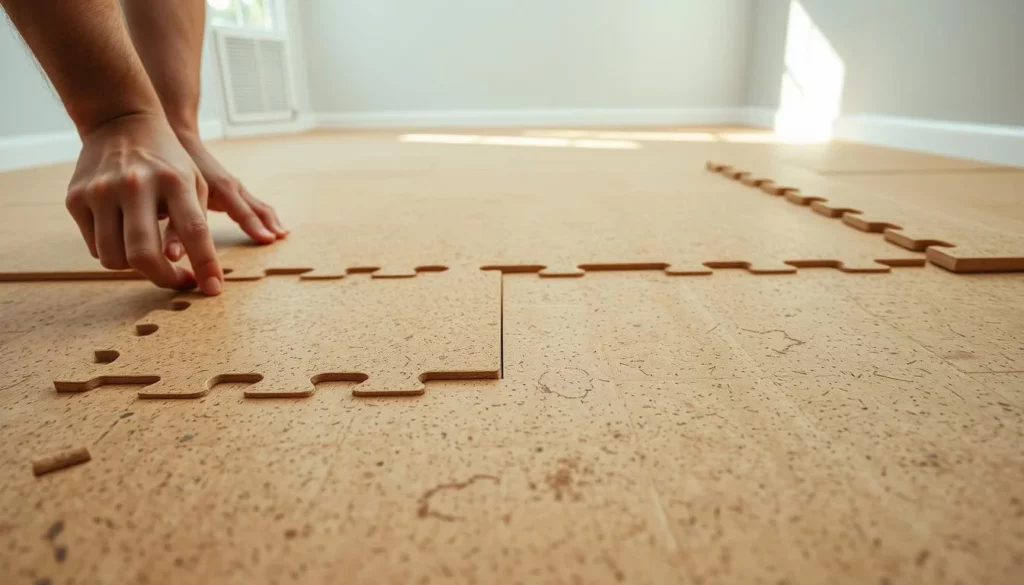
By following these steps, you can get the most out of your cork flooring. Remember, the details of installation are what make cork floors great at soundproofing.
Types of Cork Flooring Available
Looking into cork flooring shows many eco-friendly options. You can pick from various styles and formats. Each has its own benefits and features.
Cork Tiles vs. Cork Planks
Cork flooring comes in two main types: tiles and planks. Cork tiles are great for making unique designs and patterns. They let you personalize your floor. Cork planks, on the other hand, look like traditional hardwood, offering a classic look.
- Cork tiles are flexible for design and layout.
- Cork planks give a traditional look and feel.
Both cork tiles and planks use natural cork. They keep cork’s sound-absorbing qualities. Your choice depends on your style and space needs.
Cork flooring is also eco-friendly. It’s made from cork oak bark, without harming the trees. This makes it a good choice for those who care about the environment.
| Type | Eco-Friendly Features | Soundproofing Benefits |
|---|---|---|
| Cork Tiles | Recyclable, sustainable harvesting | Effective sound absorption |
| Cork Planks | Natural, biodegradable | Reduces impact noise |
| Pre-finished Cork Flooring | Low VOC emissions | Provides airborne sound insulation |
Choosing cork flooring improves your space’s soundproofing and helps the environment. Whether you go for tiles or planks, you’re making a smart, eco-friendly choice.
Maintenance of Cork Flooring
To keep your cork flooring in top shape, regular care is key. Cork flooring is durable but needs proper care to keep its soundproofing. This ensures it continues to reduce noise effectively.
Cleaning Techniques
Cleaning your cork flooring often is vital to keep it soundproof. Use a soft-bristled broom or a vacuum with a gentle setting to clean. For deeper cleaning, dampen a mop with a mild cleaning solution and wring it out well to avoid too much moisture.
For stubborn stains, use a cork flooring cleaner. Stay away from harsh chemicals or abrasive cleaners. They can harm the cork and lessen its sound-absorbing power.
| Cleaning Method | Frequency | Benefits |
|---|---|---|
| Sweeping/Vacuuming | Daily/Weekly | Removes debris, prevents scratching |
| Damp Mopping | Weekly/Monthly | Deep cleans, maintains appearance |
| Spot Cleaning | As needed | Addresses spills and stains promptly |
By sticking to these cleaning methods and care tips, you can enjoy cork flooring’s effective noise reduction and durability for many years.
Cost Analysis of Cork Flooring
Understanding the cost of cork flooring is key to making a smart choice. Cork flooring’s initial cost is similar to other options. But, its long-term benefits and durability make it a great value.
Initial Investment vs. Long-term Value
The price of cork flooring changes based on quality, thickness, and how it’s installed. Though it might cost more upfront than some floors, its durability and low maintenance make it cost-effective over time.
Cork flooring can last for decades with the right care. This means you won’t need to replace it often. Its natural ability to absorb sound also adds to its value for homeowners.
Cost Comparison with Soundproofing Alternatives
It’s important to compare cork flooring’s cost to other soundproofing materials. Here’s a table that shows how cork flooring stacks up against common soundproofing options:
| Soundproofing Material | Cost per Square Foot | Installation Complexity |
|---|---|---|
| Cork Flooring | $3-$7 | Moderate |
| Carpet | $1-$3 | Low |
| Acoustic Panels | $5-$10 | High |
| Hardwood Flooring with Underlayment | $5-$15 | High |
The table shows cork flooring is priced well compared to other soundproofing options. It’s a good deal, considering it’s both a floor and a sound blocker.
In summary, cork flooring’s upfront cost might seem high. But, its long-term benefits, durability, and soundproofing make it a cost-effective solution. Choosing cork flooring means investing in a sustainable, eco-friendly material that improves your home’s quality over time.
Environmental Benefits of Cork Flooring
Cork flooring is a natural soundproofing solution and an eco-friendly choice. It’s important to know the environmental benefits of cork flooring when choosing sustainable options for your home.
Sustainable Harvesting Practices
Cork comes from the bark of cork oak trees (Quercus suber), mainly in the Mediterranean. The harvesting is sustainable and doesn’t harm the trees. This lets them keep growing and absorbing carbon dioxide.
Cork oak forests are biodiversity hotspots, supporting many plants and animals. The cork industry helps keep these forests preserved. This supports local ecosystems and fights global climate change.
Reducing Carbon Footprint
Cork flooring is made from a natural, renewable resource. It needs little processing, making it better for the environment than synthetic materials. Cork flooring production is designed to be eco-friendly, with many manufacturers following strict environmental standards.
Cork flooring is also durable and long-lasting, reducing the need for frequent replacements. Its recyclable nature makes it a responsible choice for environmentally conscious homeowners. By choosing cork flooring, you support sustainable forestry and reduce your environmental impact.
When choosing flooring, consider cork’s environmental benefits. It helps you make a choice that aligns with your values and supports a sustainable future.
Real-life Applications of Cork Flooring
Cork flooring is versatile and perfect for many places, from homes to offices. It’s great for reducing noise, making it useful in different ways. This depends on what you need.
Residential Use Cases
In homes, cork flooring is great for places with lots of people or noise. It cuts down on impact noise from footsteps. This makes it comfy for families.
For example, it can make bedrooms quieter, helping you sleep better. It’s also eco-friendly, which is good for those who want to live sustainably.
Commercial Use Cases
In offices and other commercial places, cork flooring helps reduce noise. This makes work environments better. Schools and healthcare places also benefit from its sound-absorbing qualities.
- Offices: Reduces distractions by minimizing background noise.
- Schools: Helps maintain a quieter classroom environment, improving focus.
- Healthcare Facilities: Contributes to a more peaceful atmosphere for patients and staff.
| Setting | Benefits of Cork Flooring |
|---|---|
| Residential Homes | Reduces impact noise, eco-friendly, comfortable underfoot |
| Commercial Spaces | Reduces ambient noise, improves productivity, sustainable |
Choosing cork flooring means a quieter, more comfortable space, at home or in the office. Its special qualities make it a top pick for noise reduction.
Common Misconceptions About Cork Flooring
Cork flooring often faces misconceptions about its durability and health safety. When looking into soundproofing options, it’s key to know the truth about cork flooring.
Many worry that cork flooring is fragile and easily damaged. But, cork flooring is surprisingly resilient. It can handle a lot of foot traffic and wear well.
Durability Myths
People think cork flooring is weak because it’s soft and spongy. But, its unique properties make it great for busy areas. It can absorb impacts without getting damaged much.
Some believe cork flooring isn’t good for homes with pets or kids because it stains easily. But, properly sealed cork flooring can resist spills and stains well. This makes it a good choice for family homes.
Allergies and Health Concerns
Some worry that cork flooring might make allergies worse or be unhealthy. But, cork is natural and hypoallergenic. It’s also resistant to mold, mildew, and dust mites. In fact, cork flooring can help make your home healthier by reducing allergens.
With the right care, cork flooring is safe and healthy for your home. It’s also eco-friendly, fitting the trend for eco-friendly soundproofing options.
In summary, while there are myths about cork flooring, the truth is it’s durable, healthy, and eco-friendly. Knowing the facts can help you decide if cork flooring is right for your soundproofing needs.
Making the Right Choice for Your Home
Choosing the right flooring is key for soundproofing your home. Cork flooring is a top choice for natural soundproofing. It offers many benefits for reducing noise. Knowing your soundproofing needs helps you pick the best option for a quieter home.
Assessing Soundproofing Needs
First, think about the noise sources and how much soundproofing you need. Cork flooring can help with both impact noise from footsteps and airborne sounds. Its natural sound absorption makes it perfect for quieter homes.
Considering cork flooring’s benefits can make your home more peaceful. It’s sustainable, durable, and great for soundproofing. Investing in cork flooring can greatly improve your home’s comfort and value.
